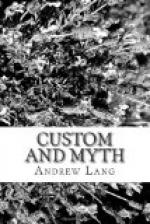At this part of the epic there is an obvious lacuna. The story goes to Kullervo, a luckless man, who serves as shepherd to Ilmarinen. Thinking himself ill-treated by the heroic smith’s wife, the shepherd changes his flock into bears and wolves, which devour their mistress. Then he returns to his own home, where he learns that his sister has been lost for many days, and is believed to be dead. Travelling in search of her he meets a girl, loves her, and all unwittingly commits an inexpiable offence. ‘Then,’ says the ‘Kalevala,’ ’came up the new dawn, and the maiden spoke, saying, “What is thy race, bold young man, and who is thy father?” Kullervo said, “I am the wretched son of Kalerva; but tell me, what is thy race, and who is thy father?” Then said the maiden, “I am the wretched daughter of Kalerva. Ah! would God that I had died, then might I have grown with the green grass, and blossomed with the flowers, and never known this sorrow.” With this she sprang into the midst of the foaming waves, and found peace in Tuoni, and rest in the waters of forgetfulness.’ Then there was no word for Kullervo, but the bitter moan of the brother in the terrible Scotch ballad of the Bonny Hind, and no rest but in death by his own sword, where grass grows never on his sister’s tomb.
The epic now draws to a close. Ilmarinen seeks a new wife in Pohja, and endeavours with Wainamoinen’s help to recover the mystic sampo. On the voyage, the Runoia makes a harp out of the bones of a monstrous fish, so strange a harp that none may play it but himself. When he played, all four-footed things came about him, and the white birds dropped down ’like a storm of snow.’ The maidens of the sun and the moon paused in their weaving, and the golden thread fell from their hands. The Ancient One of the sea-water listened, and the nymphs of the wells forgot to comb their loose locks with the golden combs. All men and maidens and little children wept, amid the silent joy of nature; nay, the great harper wept, and of his tears were pearls made.
In the war with Pohjola the heroes were victorious, but the sampo was broken in the fight, and lost in the sea, and that, perhaps, is ’why the sea is salt.’ Fragments were collected, however, and Loutri, furious at the success of the heroes of Kalevala, sent against them a bear, destructive as the boar of Calydon. But Wainamoinen despatched the monster, and the body was brought home with the bear-dance, and the hymn of the bear. ‘Oh, Otso,’ cry the singers, ’be not angry that we come near thee. The bear, the honey-footed bear, was born in lands between sun and moon, and he died not by men’s hands, but of his own will.’ The Finnish savants are probably right, who find here a trace of the beast-worship which in many lands has placed the bear among the number of the stars. Propitiation of the bear is practised by Red Indians, by the Ainos of Japan, and (in the case of the ‘native bear’) by Australians. The Red Indians have a myth to prove that the bear is immortal, does not die, but, after his apparent death, rises again in another body. There is no trace, however, that the Finns claimed, like the Danes, descent from the bear. The Lapps, a people of confused belief, worshipped him along with Thor, Christ, the sun, and the serpent. {176}




